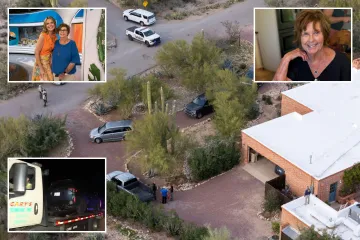Chilling second deadline in Nancy Guthrie ransom note passes despite Savannah’s promise she’ll pay kidnappers

THE chilling second deadline for Nancy Guthrie’s ransom has passed despite Savannah promising she would pay the kidnappers who took her elderly mom.
The heartbroken Today star urged everyone to keep an eye out for anything suspicious as an exchange deadline written in a reported ransom note passed without word of Nancy’s release.
The ransom note indicated that Nancy could be harmed if the demand of a payment of $6 million in Bitcoin is not met by Monday at 5pm MST.
Hours before the deadline came to pass, Savannah returned to social media to inform the public they couldn’t continue this search alone.
“I wanted to come on and share a few thoughts as we enter into another week of this nightmare,” she said in the video.
“Law enforcement is working tirelessly, around the clock trying to bring her mom, trying to find her.
What we know about Nancy Guthrie’s disappearance…
“She was taken and we don’t know where. And we need your help,” she said.
Savannah thanked the public for their prayers, which she previously said were what her family needed most, but made it clear they could need witnesses find Nancy.
“I’m coming on not just to ask you for your prayers but no matter where you are, even if you’re far from Tucson, if you see anything, if you hear anything, if there’s anything at all that seems strange to you, that you report to law enforcement,” she said.
“We are at an hour of desperation.”
Despite everything, Savannah said she and her siblings believe their mother can feel the prayers, no matter where she may be.
“We believe that somehow, some way, she is feeling these prayers, and that God is lifting her even in this moment, in this darkest place,” said the anchor.
“We believe our mom is still out there.”
Investigators believe that the 84-year-old grandmother was abducted from her home in Tucson, Arizona in the early morning hours of February 1.
The deadline comes after Savannah and her siblings sent a cryptic message to their mother’s believed kidnappers promising to pay the ransom.
“We received your message, and we understand,” Savannah said in a video posted to Instagram on Saturday.
“We beg you now to return our mother to us so that we can celebrate with her.
“This is the only way we will have peace. This is very valuable to us, and we will pay.”
SEARCH CONTINUES
Saturday’s message is the third the family has released appealing to the alleged kidnappers.
The FBI and Pima County Sheriff Chris Nanos announced Friday that they were “aware of a new message regarding” Nancy’s disappearance sent to local news stations.
Previous ransom notes set a deadline for Thursday at 5pm.
After the deadline passed, Savannah’s brother Camron released a video asking for a way to speak with the purported kidnappers.
The change in tone in Savannah’s Saturday message has led experts to speculate if the Guthrie family has opened a line of communication with the ransomers.
Investigators have not shared which, if any, ransom notes are legitimate.
RANSOM QUESTIONS
The shifting deadlines and lack of proof of life has led some experts to doubt the legitimacy of the notes.
Former FBI Assistant Director Chris Swecker shared that he worries that bad actors are taking advantage of the situation and “playing with” the Guthrie family.
“I really think there’s a third party here that’s just playing with them, opportunists who think they can exploit this situation,” he said on Fox News Sunday.
Swecker added that the situation has not followed the pattern of a typical kidnapping-for-ransom plot.
“If this was a kidnapping, it would be a very simple matter to authenticate and provide proof of life,” Swecker continued, noting that no evidence has been “credibly authenticated at this point.”
“You have to allow for the possibility that this was something more or something other than a kidnapping,” he said.
The family has already been targeted by a ransom hoax.
On Thursday, Derrick Callella from California was arrested and charged for sending fake text messages demanding Bitcoin payments.
INVESTIGATION CONTINUES
Law enforcement officials were seen leaving Annie Guthrie’s property on Saturday night with a bag.
Investigators returned to Nancy’s property the following morning to search the water septic tanks.
Nancy was last seen on January 31, when she was dropped off at home by her son-in-law Tommaso Cioni after they had a meal with his wife and her daughter Annie Guthrie.
Nancy was reported missing by her family the following day when a parishioner at the mom’s church said she failed to show up for service.
Cops have only given grim updates so far, and admitted they have no suspects and no strong leads.
Timeline of Nancy Guthrie’s disappearance
Nancy Guthrie, the 84-year-old mother of Today show co-anchor Savannah Guthrie, disappeared from her home on February 1, 2026.
Timeline:
- January 31, 5:32 pm: Nancy Guthrie jumps in an Uber and travels to a relative’s house for dinner.
- January 31, 9:48 pm: Family members drop off Nancy, 84, at her home in Tucson, Arizona, after having dinner with her.
- January 31, 9:50 pm: Nancy’s garage door closes.
- February 1, 1:47 am: Nancy’s doorbell camera disconnects.
- February 1, 2:12 am: Software detects person on camera (No video available, no subscription).
- February 1, 2:28 am: Nancy’s pacemaker app shows disconnect from her phone.
- February 1, 11:00 am: A parishioner at Nancy’s church calls the mom’s children and says she failed to show up for service.
- February 1, 11:56 am: The family goes to Nancy’s home to check on her.
- February 1, 12:03 pm: A 911 to the Pima County Sheriff’s Department is placed by the family.
- February 1, 12:15 pm: Pima County deputies arrive at Nancy’s residence.
- February 1, 8:55 pm: The Pima County Sheriff’s Office gives their first press conference, and reveals some clues found at Nancy’s home caused “grave concern.” They say helicopters, drones, and infrared cameras are all being utilized in the search.
- February 2, 9:17 am: Pima County Sheriff Chris Nanos says search crews have been pulled back, as Nancy’s home is considered a crime scene.
- February 2, morning: Savannah releases a statement that’s read by her co-hosts on Today, and thanks supporters for their prayers.
- February 2, evening: Nanos tells the media they fear Nancy has been abducted.
- February 3: Nanos admits they have no suspects, no leads, and no videos that could lead to Nancy’s recovery. He and the FBI beg for more tips and accounts from residents.
- February 3: A trail of blood is pictured outside Nancy’s home, where there were reportedly signs of forced entry.
- February 6: Police seize car from Nancy’s home
- February 7: Savannah says ‘we will pay’ ransom for her mom’s return



